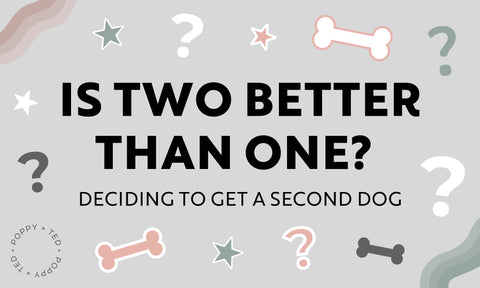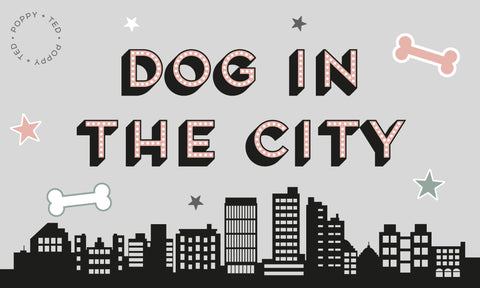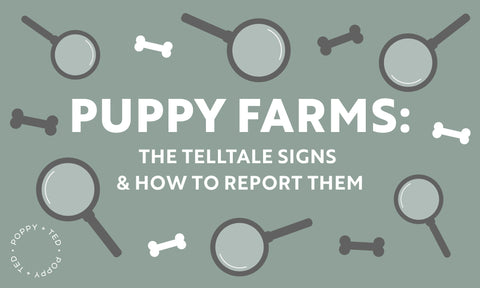 So, you’ve decided to expand the pack? Perhaps your furry canine companion looks a bit lonely and needs a friend. Considering getting a second dog can be exciting, especially if you have one in mind. Some think this process will be easier than adapting to life with your first dog. However, challenges still arise when adding a second pooch to the family.
So, you’ve decided to expand the pack? Perhaps your furry canine companion looks a bit lonely and needs a friend. Considering getting a second dog can be exciting, especially if you have one in mind. Some think this process will be easier than adapting to life with your first dog. However, challenges still arise when adding a second pooch to the family.
You might be thinking about getting a second dog for many potential reasons. One of the most common reasons is guilt around leaving your dog alone in the house. Do you think they would feel less isolated if they had someone to play with? Another popular reason for getting a second dog is to reduce destructive or angry behaviour in your current dog. While this may work in theory, depending on your dog’s disposition, it could worsen the situation.
So, what should you do when looking for a second dog? Whatever the reason, adding another pup to your family has the potential to bring joy, happiness, and playfulness into your home! At the end of the day, it’s down to you and your dog whether a second pup will be right for you. We have compiled our best advice so you can gain insight and be better informed about getting another dog.
Pros of a Second Pooch
1. You’re replacing a deceased pet
Losing a pet is never an easy time, both for you and your dog. You have both lost a companion, which can be challenging for the remaining dog to comprehend, particularly if you’ve had both dogs for many years. Introducing another younger dog into the picture can be a great way to fill this empty space. You already know that your dog will get on well with another pet in the house.
2. Your dog loves other dogs
Dogs are generally social animals. Some prefer the canine company. But it is essential to recognise when your dog wants to be part of a pack or would rather be the lone wolf. If you know your dog gets on well with other dogs and enjoys a play date or two, adding another pooch into the picture may happen naturally.
3. You’re anticipating the loss of your current dog
Sadly, dogs come and go in life. Rather than suffer the loss of your beloved furry companion alone, you can introduce a younger dog into your life before your current dog has passed. Older dogs are much more likely to respond well to a new addition to the family. They are often more mature and too tired to retaliate against the second dog. A younger dog can even bring a new lease of life to an older one. However, you need to ensure that you don’t get a dog that will aggravate an older dog, mainly if they are unwell or have limited mobility.
4. You can afford the added time & expense
One of the key factors to consider when getting another dog is affordability. If you know that your budget can accommodate another dog, this can be great to spend your money on. The love you can bring into your home with a second dog is priceless.
The Downside of Another Dog
1. They’re expensive
If you don’t have the money to spare, the added expense is one of the biggest downsides to adding another dog to your home. You have to seriously consider whether it is feasible to own a second pet. While it is double the love, it is also double the food, insurance, and vet bills, not to mention collars, leads, harnesses, and more.
2. It’s not a guaranteed friendship
While your current dog may be sociable and get along well with other dogs, you can’t always guarantee their friendliness. Some dogs are protective when it comes to their patch and may not be welcoming of another dog in your home. It is always advisable to introduce your new dog to your current one to get an idea of how well they mix.
3. They require more time & training
Whether you are planning to adopt an older dog, or are looking to buy a new puppy, will determine the amount of training they require. You may have already raised your current dog from being a puppy, but you could afford to give them 100% of your attention. This is difficult to achieve with two dogs. Your first dog will still need the same amount of attention and exercise as well as giving attention to your new dog.
4. They make twice the mess!
If you already struggle to keep up with vacuuming the dog hair and mopping the muddy pawprints off the floor, then you’ll have to do this twice with a second dog. Opting for a shorthaired dog breed or one that doesn’t moult can significantly reduce mess. But you can do nothing to stop them from jumping in those muddy puddles!
The Dog Breeds That Make Good Second Dogs
Some breeds are more open to mixing than others. Although you may already have a breed in mind for your second dog, it is worth considering their compatibility with other dog breeds. Size plays a huge role in how well dogs mix. If you already have a large male alpha dog, you will want to avoid getting another dog of this type. Their interactions will be much more combative with a constant fight for dominance. You will have much more success pairing your larger dog with a small, docile dog breed to counteract them.
So, which breeds make the best second dogs?
Golden Retriever
Golden Retrievers are renowned for being even-tempered bundles of joy. Their inherently patient, kind, and obedient nature makes them a really versatile dog breed. They can fit in well in almost any setting, including small children. Most importantly, they are happy around other dogs. When trained well, they will remain loyal and well-behaved.
Spaniel
Gentle and easy going dogs, any breed of spaniel is a winning candidate for a second dog. They have a lot of energy and can be very playful but can be trained effectively and respond well to demands. A spaniel's energy can greatly counterbalance the temperament of larger or older dogs. Their smaller size also makes them less of a threat to large alpha dogs.
St Bernard
St Bernards are the definition of gentle giants. If you have your heart set on a larger dog breed for your second dog, then a St Bernard can be a safe option. They typically have a gentle and loving nature and are tolerant of many other dog breeds. They seek to please their owners, making them obedient and loyal. Their long hair may mean more added mess, but it is a small sacrifice for a beautiful dog.
Get the Right Supplies For Your Second Dog
The most important thing you can do when getting a second dog is to be prepared. Making sure you have all the right supplies can help you pay better attention to your new pup. Getting off to a good start will make all the difference. Having the right lead, harness, and plenty of poop bags is essential when adding a second dog to your family!
Related Blog Posts
Which Dog Breed Suits Me Best?
A Dog Is For Life, Not Just For Lockdown
The Positive Impact Dogs Have on Our Mental Health



